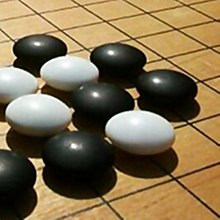|
Honinbo
Honinbo (or Hon'inbō, 本因坊) is a title used by the head of the Honinbo house or the winner of the Honinbo tournament. Honinbo houseThe Honinbo house was a school of Go players officially founded in 1612 and discontinued in 1940. The founder was the Buddhist priest Nikkai, and 1612 is the year when Oda Nobunaga started sponsoring the school. The name Honinbo was that of the pavilion on the grounds of the Jakkoji temple in Kyoto where Nikkai lived. When the capital was moved to Tokyo, Nikkai moved along and turned "Honinbo" into a title, calling himself Honinbo Sansa.[1] Heads of the Honinbo house
Note: The 17th and 19th Honinbo are the same person, and the 16th and 20th are the same, too. The titles 22nd-26th Honinbo are honorary titles given to players who won the Honinbo tournament sufficiently often. Honinbo tournamentThe Honinbo Tournament is a yearly tournament for the title of Honinbo, held since the retirement of Shūsai. First Honinbo tournamentThe last Honinbo, Shusai, gave (or sold [2]) his title in 1938 to the Nihon Ki-in, to be awarded in a yearly tournament. Preliminary tournaments were held in 1939 and 1940, and the final title match, between Sekiyama Riichi and Kato Shin, in 1941. This match ended in a tie, 3-3. Since Sekiyama had been first after the preliminary tournaments, he was declared winner. Thus, Sekiyama Riichi became the first to bear this new title Honinbo. Honinbo nameSome winners of the Honinbo tournament choose an art name (professional name). For the first two the name was chosen by the Nihon Ki-in. For example, Sekiyama was called Honinbo Risen (本因坊 利仙).
For more details, see ja:本因坊#本因坊戦勝者と雅号 Further Honinbo tournamentsThere are now several further tournaments with names involving 'Honinbo', such as the Women's Honinbo tournament, the Amateur Honinbo tournament, and the Student Honinbo tournament. Since 1963, there is a yearly game between the current professional Honinbo and the Amateur Honinbo.[6] References
External linksSources
Information related to Honinbo |
